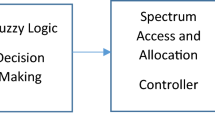Abstract
Cognitive radio (CR) is a popular wireless technology for efficient utilization of spectrum. CR network senses the unused frequency bands of the primary users (PUs) and assign them to the unlicensed secondary users (SUs). One of the major challenges in cognitive network is the allocation of available spectrum which indirectly contributes to the efficient spectrum utilization. A novel intelligent dynamic spectrum allocation with bandwidth flexibility is presented in this paper. Fuzzy inference system has been used to evaluate and rate the channel (CH) quality and the SU. The quality based spectrum allocation has been carried out. As the primary CH bandwidth differ from the SU and in the case, the SU bandwidth is lower to PU, accommodation of more than one secondary CH into primary is possible. To utilize this facility, bandwidth flexibility is incorporated in the intelligent spectrum allocation. The intelligent spectrum allocation techniques are compared with the sequence based method of spectrum allocation and priority based allocation. The quality measures utilized for comparison are service rate, average packet loss and average delay. On these measures intelligent dynamic bandwidth flexible spectrum allocation method is found to be better, compared to other three methods.










Similar content being viewed by others
References
Mitola, J., Maguire, G.Q.: Cognitive radio: making software radios more personal. IEEE Pers. Commun. 6(4), 13–18 (1999)
Attar, A., Nakhai, M., Aghvami, A.: Cognitive radio game: a framework for efficiency, fairness and QoS guarantee. In: Proceedings of ICC, 2008, pp. 4170–4174
Akyildiz, I.F., Lee, W.-Y., Vuran, M.C., Mohanty, S.: Next generation/dynamic spectrum access/cognitive radio wireless networks: a survey. Comput. Netw. 50, 2127–2159 (2006)
Azarfar, A., Frigon, J.-F., Sans‘o, B., Analysis of cognitive radio networks based on a queueing model with server interruptions. In: Proceedings of IEEE International Conference on Communications, ICC 2012, June 2012, pp. 1703–1708
Kim, K.: T-preemptive priority queue and its application to the analysis of an opportunistic spectrum access in cognitive radio networks. Comput. Oper. Res. 39(7), 1394–1401 (2012)
Li, S., Luan, T., Shen, X.: Spectrum allocation for smooth video delivery over cognitive radio networks. In: Proceedings of IEEE GLOBECOM, Miami (2010)
Liu, S., Lazos, L., Krunz, M.: Cluster-based control channel allocation in opportunistic cognitive radio networks. IEEE Trans. Mob. Comput. 11(10), 1436–1449 (2012)
Ding, L., Melodia, T., Batalama, S., Matyjas, J., Medley, M.: Crosslayer routing and dynamic spectrum allocation in cognitive radio ad hoc networks. IEEE Trans. Veh. Technol. 59(4), 1969–1979 (2010)
Hoang, A., Liang, Y.: Maximizing spectrum utilization of cognitive radio networks using channel allocation and power control. In: 2006 IEEE 64th Vehicular Technology Conference, 2006. VTC-2006 Fall, pp. 1–5. IEEE (2006)
Hoang, A., Liang, Y., Islam, M.: Power control and channel allocation in cognitive radio networks with primary users’ cooperation. IEEE Trans. Mob. Comput. 9(3), 348–360 (2010)
Jo, O., Cho, D.-H.: Efficient spectrum matching based on spectrum characteristics in cognitive radio systems. In: Proceedings of WTS, 2008, pp. 230–235
Al-Zubi, R., Siam, M., Krunz, M.: Coexistence problem in IEEE 802.22 wireless regional area networks. In: Proceedings of IEEE GLOBECOM Conference, 2009, pp. 1–6
Nie, N., Comaniciu, C., Agrawal, P.: A game theoretic approach to interference management in cognitive networks. Wirel. Commun. 07030, 199–219 (2007)
Park, J., Paweczak, P., Cabric, D.: Performance of joint spectrum sensing and MAC algorithms for multichannel opportunistic spectrum access ad hoc networks. IEEE Trans. Mob. Comput. 10(7), 1011–1027 (2011)
Ko, G.: Channel management in IEEE 802.22 WRAN systems. IEEE Commun. Mag. 48(9), 88–94 (2011)
Zhang, H., Ruyet, D., Roviras, D., Sun, H.: Noncooperative multicell resource allocation of FBMC-based cognitive radio systems. IEEE Trans. Veh. Technol 61(2), 799–811 (2012)
Gowrishankar, K., Chandrasekar, C., Kaniezhil, R.: Maximum possibility of spectrum access in cognitive radio using fuzzy logic system. Int. J. Eng. Res. Appl. 2(4), 1408–1415 (2012)
Hani, M.B., Salameh, H.B., Jararweh, Y., Bousselham, A.: Traffic-aware self-coexistence management in IEEE 802.22 WRAN systems. In: Proceedings of the 7th IEEE GCC Conference, November 2013, pp. 507–510
Pennanen, H., Tolli, A., Latva-aho, M.: Robust beamforming with decentralized interference coordination in cognitive radio networks. In: Proceedings of the IEEE International Conference on Acoustics, Speech, and Signal Processing, 2014
Doulat, A.: Software defined framework for multi-cell cognitive radio networks. In: Proceedings of the 10th IEEE International Conference on WiMob, October 2014, pp. 513–518
Shu, T., Li, H.: QoS-compliant sequential channel sensing for cognitive radios. IEEE J. Sel. Areas Commun. 32(11), 2013–2025 (2014)
Salameh, H.B.: Efficient resource allocation for multicell heterogeneous cognitive networks with varying spectrum availability. IEEE Trans. Veh. Technol. 65(8), 6628–6635 (2016)
Zhang, W., Liu, X.: Centralized dynamic spectrum allocation in cognitive radio networks based on fuzzy logic and Q-learning. China Commun. 8(7), 46–54 (2011)
Wang, H., Ren, J., Li, T.: Resource allocation with load balancing for cognitive radio networks. In: 2010 IEEE Global Telecommunications Conference GLOBECOM 2010, December 2010, pp. 1–5. IEEE (2010)
Wang, W., Kasiri, B., Cai, J., Alfa, A.: Channel assignment of cooperative spectrum sensing in multi-channel cognitive radio networks. In: 2011 IEEE International Conference on Communications (ICC), pp. 1–5. IEEE (2011)
Salameh, Bany: H.A., El-Attar, M.F.: Cooperative OFDM-based virtual clustering scheme for distributed coordination in cognitive radio networks. IEEE Trans. Veh. Technol. 64(8), 3624–3632 (2015)
Author information
Authors and Affiliations
Corresponding author
Rights and permissions
About this article
Cite this article
Veeramakali, T., Jayashri, S. & Prabu, S. Intelligent dynamic spectrum allocation with bandwidth flexibility in cognitive radio network. Cluster Comput 20, 1575–1586 (2017). https://doi.org/10.1007/s10586-017-0864-x
Received:
Revised:
Accepted:
Published:
Issue Date:
DOI: https://doi.org/10.1007/s10586-017-0864-x




